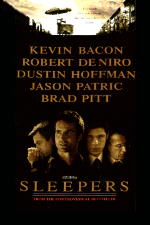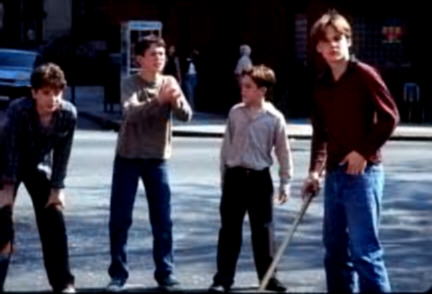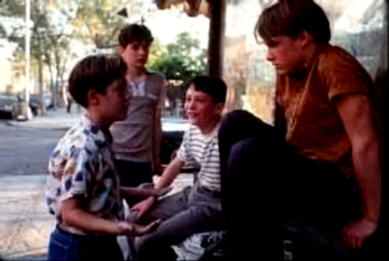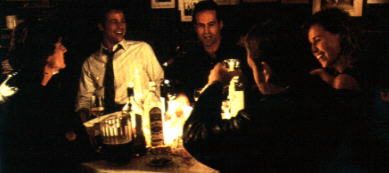


It was to be one of these pranks that changed the lives of these four boys forever. The plan was simple, Shakes was to ask for a hot-dog from the vendor and run without paying, the vendor would give chase allowing Butter, John, and Michael time to feast from the abandoned cart. The three decided to confuse the vendor, by pushing it to a subway entrance. They couldnít hold onto it and the cart traveled down the flight of stairs, hitting and paralyzing an elderly man exiting the sub-terrainian rail. Not even the pleas from their influential advocates a Catholic priest named Father Bobby (Robert De Niro) or the antiquated crime lord King Benny could exonerate the four hapless boys. They were sentenced to no less than ten months to no more than one year in a correctional facility, the Wilkinson Home for Boys.
Upon arriving at Wilkinson the four boys were assigned to C block and came under the supervision of four guards: Sean Nokes (played viciously by Kevin Bacon), Henry Addison, Ralph Ferguson, and Adam Styler. The boys soon discovered what Father Bobby wanted to say but couldnít. The boys were thrown into a never-ceasing sea of torture and torment, constantly abused by the guards, each choosing a boy for their personal "use". Homosexual rapes and daily beatings continued on at their stay in Wilkinson, too intimidated, frightened and embarrassed to speak out, they remained stifled for the duration of their stay. Gone was Tommyís ever-present smile, his innocence crushed-- his eyes glazed over by the memories he tried so hard to forget. Gone was Johnís cute arrogance, replaced with vile malice, the love driven from his heart. Michael, introverted beyond recognition, would never allow himself to grow close to anyone, burring his painful memories deep down in the now-hollow core of his hardened heart. The boys served their sentences and returned to Hellís Kitchen. Life was never the same for them, promising each other never to speak of their experiences in Wilkinson.
The time jumped to 1979, John (Ron Eldard) and Butter (Billy Crudup) were now the leaders of the West Side Boys, a local murderous gang that ran Hellís Kitchen (with provided room for King Benny of course). The two in their black getup entered their current stop at Shamrock Pub only to be reunited with an old "friend". They shot Sean Nokes dead on the scene, four bullets in the head, one in each appendage and four in the heart. They were killers, created by the man they now stood over: their first taste of revenge. Michael (Brad Pitt), an assistant DA, persuaded his senior to let him prosecute the case. Michael had a plan and that involved intentionally loosing the case to save his friends. He would expose the truth about Sean Nokes, and what went on inside the cells of Wilkinson, in open court. With the help of Shakes (Jason Patrick), who was with the New York Times; a local childhood flame, Carol Martinez (Minnie Driver); and with some strings pulled by King Benny and the boysí obese Puerto Rican mentor, Fat Mancho; the truth was exposed in court.
All the defense needed now was a witness, to swear under oath that John Reilly and Thomas Marcano were never near Shamrock Pub on that fateful night. They found their witness in a reluctant priest. Father Bobby struggled with his decision to lie for the boys; it was against everything he now stood for. In the end he choose to protect his boys and testifying, swearing to God under oath, that John and Tommy were with him at a New York Knicks game that entire evening, brandishing three ticket stubs to prove this. The jury agreed upon an acquittal and the two killers were free. Michael Sullivan quit his job and moved to England, hoping to escape the memories of Hellís Kitchen. Deep down he knew he could never escape-- a part of him was left behind at Wilkinson; he would eat, sleep, and think at Wilkinson for the rest of his life. John Reillyís body was found in an alley-- bloated and full of alcohol and drugs. Wilkinson had changed him to the point of death. His way of life was the only way he could feel in control after his experience at Wilkinson. Tommy "Butter" Marcanoís body was found in a secluded lakefront cabin, four bullets in his head. He too could only find control in the world of crime-- Wilkinson took his life as did Johnís. Shakes aged and found time to write, finishing his autobiography that would later be turned into a blockbuster movie.
Sleepers is one of the best movies I have ever seen. It is both convicting and powerful, it made me nauseous, and it made me laugh. I was there in Hellís Kitchen in 1963 experiencing life on the streets of New York. I was there when the boys pushed the hot dog cart down the flight of stairs into the subway. And most frightening, I was there in Wilkinson, getting abused: raped and beat along with my closest friends. I felt I was the invisible fifth friend laughing, suffering, and enduring right along side the boys who were my true best friends for the duration of the movie. I literally cheered when Nokes was shot. I never get worked up over media of any kind, yet every emotion I had was played upon and pushed to the extent of their boundaries, probably even over. The story is true and that is why it is so sharp-- striking deep into my soul, penetrating each sense-- nothing was left untouched by this movie. I wanted to enter the scene-- enter into Wilkinson-- and rescue my friends. This movie evoked in me a hatred I have never felt, a hatred for people I have, and never will, meet, and that frightens me.
Now I will have to reveal plot points. There is a flash-forward to the summer of 1981. Two of the boys, now about 28 and gangsters themselves, walk into a restaurant, see Nokes, and shoot him to death. They are brought to trial. But one of the original four, Shakes (Jason Patric) now works for a newspaper. Another, Michael (Brad Pitt), is an assistant D.A. They fashion a scheme in which Michael will try the case in such a way that their two old friends will beat the rap.
``Words like `payback time' and `revenge' came to mind,'' Shakes, the narrator, tells us. King Benny, still running the neighborhood, arranges for an alcoholic lawyer named Snyder (Dustin Hoffman) to defend the killers because he can be ordered to follow the script. Everything depends on the willingness of good Father Bobby to provide the defendants with an alibi.
On the surface, this is a story about justified revenge. Dig a little deeper and it gets complicated. The two defendants have become professional mobsters and killers. After their trial, they go back to killing. The priest observes, ``I know what they were and I know what they are and it's not about that.'' The movie's real subject is a homophobic revenge fantasy, which it justifies with the Cosa Nostra version of honor.
Consider the priest. Nothing in the film indicates he is anything other than absolutely truthful, upright and moral. When he's asked to perjure himself, there is an effective shot: The camera remains on De Niro in closeup, while he thinks, and thinks. The next time we see him is on the witness stand. In a movie flowing with dialogue, he is not given a single word to explain his decision, possibly because the filmmakers know it cannot be explained--anything he says would expose the shallow morality.
Father Bobby must know ``his'' boys are killers themselves--doing to others worse than what was done unto them (unless homosexual rape is worse than death, a notion the movie flirts with). Father Bobby's church and faith are unequivocal: Murder is wrong, revenge is wrong, two wrongs do not make a right. What the movie is arguing, when Father Bobby lies on the stand, is that the mob-oriented ``values'' of the ``neighborhood'' run deeper and take precedence over the values of the priest's faith.
So what we really have here is a situation in which the pop culture version of the Mafia code, as popularized by the evangelist Mario Puzo and elaborated by his acolytes like Carcaterra, is valued above traditional morality. If you doubt that the movie depends on homophobia to justify its morality, ask yourself: If the boys had been beaten but not sexually molested, would the movie play the same way? Would the priest arrive at the same decision? Would the verdict seem as justified?
It's necessary to discuss the underlying morality of ``Sleepers'' because the movie so smugly tries to exploit it without acknowledging it. That said, I must report this is a pretty good movie on more superficial levels. Dustin Hoffman gives a fine, subtle, quavering performance as the shaky defense lawyer who asks his questions so quietly that one witness cannot quite believe what is happening to him. Kevin Bacon is a strong, effective villain. Robert De Niro is used more for his aura than his skills, but makes Father Bobby into the most believable character in the movie.
Jason Patric and Brad Pitt, as the two conspirators, seem more like Woodward and Bernstein in ``All the President's Men'' than like former West Side Boys, but that's how stars are useful: By casting their roles with stars and casting the two defendants with unknowns, the movie tilts us toward the success of the plot and away from the guilt of the killers.
I liked the way the film evoked Hell's Kitchen; there is a whiff of Martin Scorsese's ``Mean Streets.'' Some of the supporting performances--especially Gassman's--were colorful. The courtroom scene works, as most courtroom scenes do. As entertainment, the movie functions successfully.
 Great for Wallpaper
Great for Wallpaper





